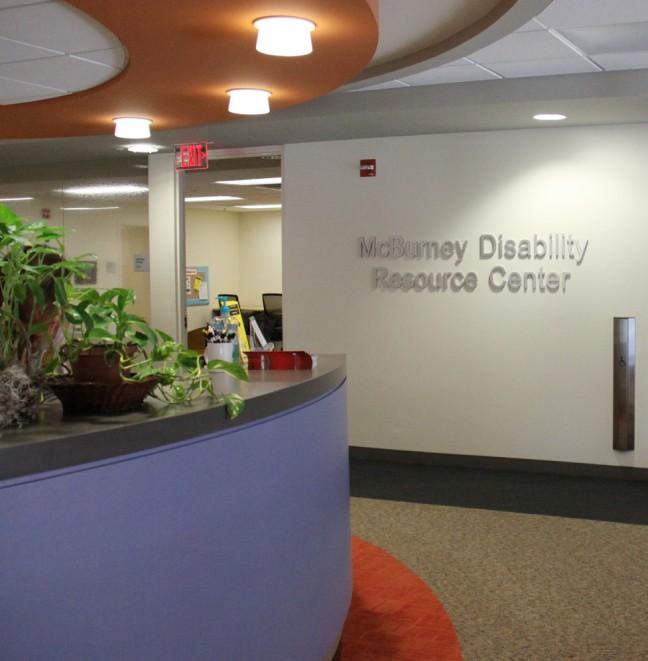The absence of in-person classes posed numerous challenges for students this semester, however, for students with disabilities, a COVID-19-conscious learning format presents new, unique challenges.
Housed across the street from Gordon’s Market, the McBurney Disability Resource Center serves students with disabilities and classroom accommodation needs at the University of Wisconsin. As part of the student accommodation process, the McBurney Center works collaboratively with students and instructors to provide effective accommodations.
Assistant Dean and Director of the McBurney Disability Resource Center Mari Magler said because McBurney includes such a large volume of students with a wide range of abilities, everyone’s experiences are different.
“I think the challenging part is that students with disabilities are not one collective body,” Magler said. “Some students are doing great and the move to remote education helped reduce barriers. For other students, they are experiencing new barriers they didn’t experience when they were in person classes, so it definitely varies and it depends on the individual.”
UW announces hybrid course instruction model for spring semester
President of Advocates for Diverse Abilities Em Giombi said although the types of disabilities may vary from student to student, taking classes throughout the pandemic meant a learning curve for all parties involved.
Giombi said moving to an online format can make it challenging for students with disabilities to access the accommodations they would typically receive in an in-person setting. Giombi said the techniques professors use have had varied success as the semester has progressed.
“Most of my professors have been pretty accommodating, but there’s not a lot of wiggle room when it comes to coming in outside of office hours or supplementary presentations in class time,” Giombi said. “There has been an ongoing conversation between students in the McBurney center and their professors to best adapt classes for students with disabilities.”
Magler said oftentimes what students with disabilities generally need is access to resources, as well as an inclusive environment. The McBurney Center exists to help these students, as well as their instructors, navigate both effectively.
Magler said access consultants at the Center mainly help students in need of additional support, however, she said staff members at the McBurney Center don’t have the capacity to reach out to every individual, as the Center is home to about 3,000 students.
“It’s hard to answer how students feel because I think one of the things is that the office hasn’t done much surveying of students to get a sense of how they’re doing,” Mahler said. “However, I think it is likely easier for some and harder for others. I believe campus will be sending a student survey out next week, so that may give us some more insight into this.”
Giombi said this semester brought up a number of issues students and staff alike have not previously faced, both on and off-campus. Some examples include access to COVID-19 testing sites and voting locations, as well as increased stress for students who have test anxiety and speech impairments.
College campuses contribute to Wisconsin’s high level of COVID-19 cases
Giombi said although the university has made efforts to help students with disabilities in the past, recently, students have had to actively advocate for the assistance they require.
“Getting help has been kind of reactive and [the] university is combating problems that probably should have been thought of beforehand,” Giombi said. “We haven’t been asked what we need in terms of helping out with our disabilities. Being a student with disabilities, learning is not easier for us. Nobody knows what they’re doing anyway, and adding a disability on top of it makes things more challenging.”
Magler said perhaps the most important aspect of creating an effective environment for students with disabilities is ensuring every student knows the options they have through the McBurney Center. She also said she relies on getting out the McBurney Center’s message through events at SOAR or announcements professors make in class.
Giombi said this semester may provide challenges for certain students to receive access to certain accommodations they may need in an online environment.
UW celebrates Latinx Heritage Month amid COVID-19 challenges
“When you apply for accommodations, you need a healthcare professional’s check off that you struggle with a disability or disorder and sometimes students don’t realize they need more time or anxieties arise that can’t be signed off by a healthcare professional,” Giombi said. “If you start developing anxiety, for example, and you’re having problems getting a proper diagnosis, it’s going to be difficult for the university to provide accommodations, which can present challenges.”
Overall, however, Giombi and Magler both said the semester created a multitude of both challenges and learning opportunities for students and staff alike.
Giombi said although some teaching techniques proved more effective than others, this trial and error process reflected the ever-changing environment COVID-19 presented for students.
Giombi stressed the value of flexibility when possible on the part of students.
“We have to adapt to the COVID world that’s always changing,” Giombi said.













